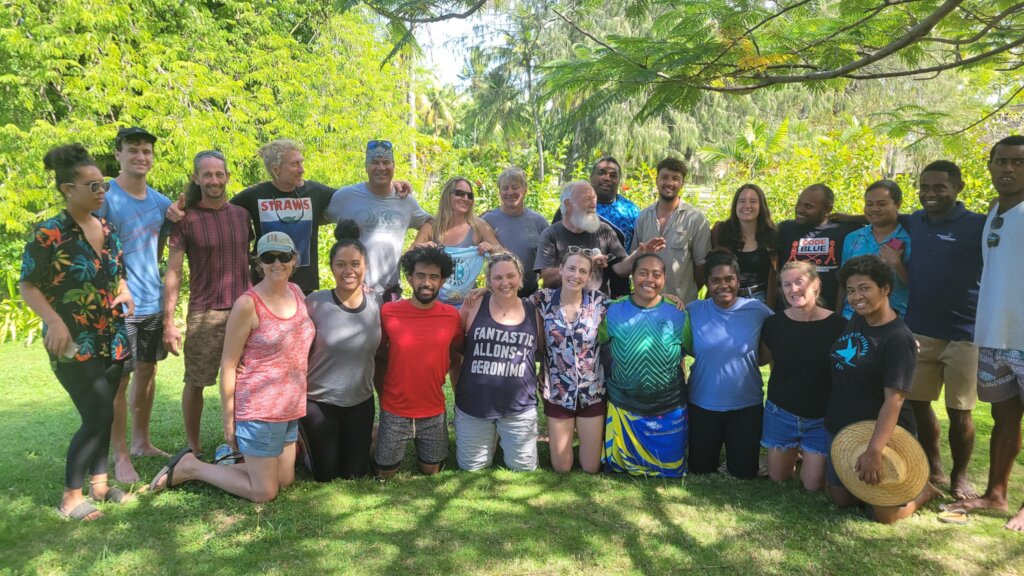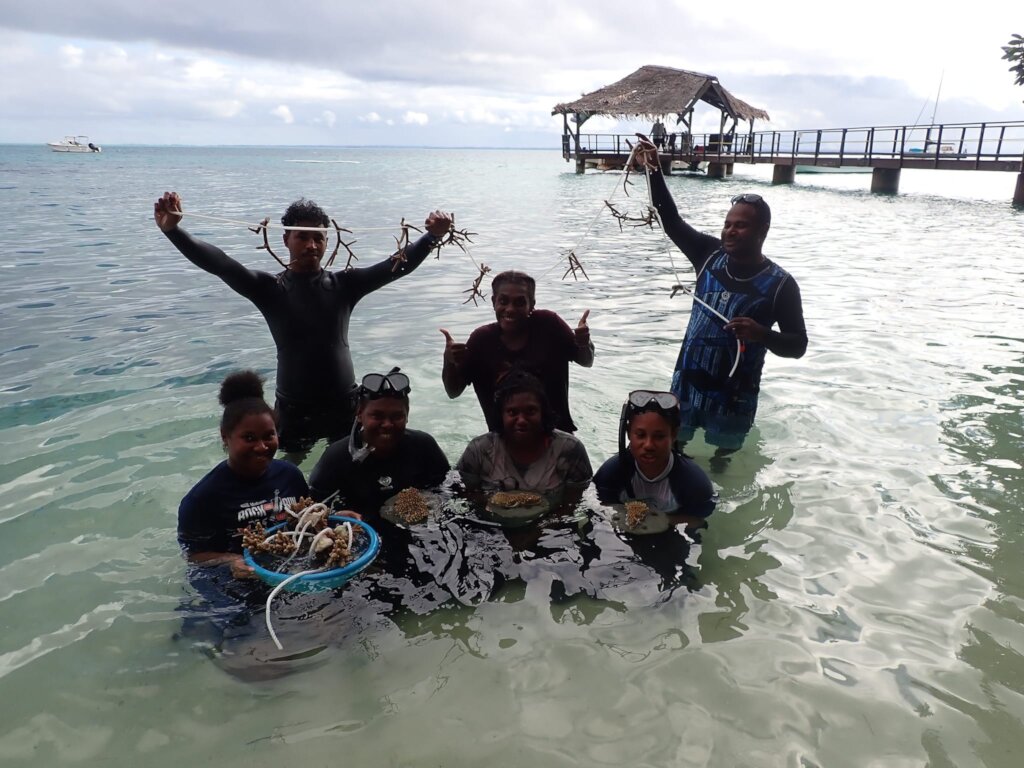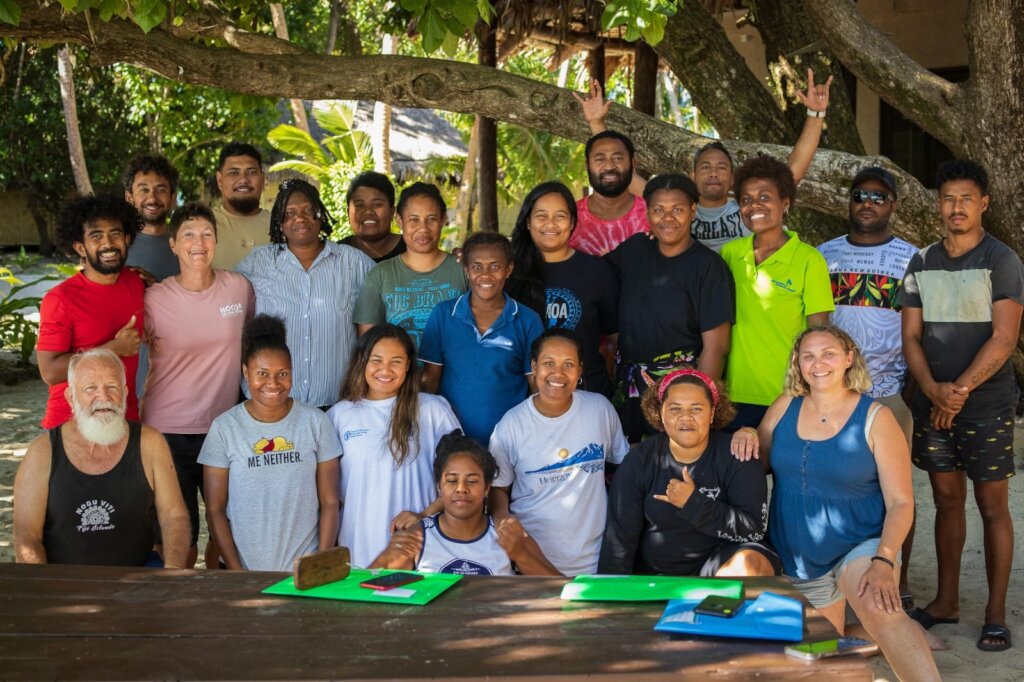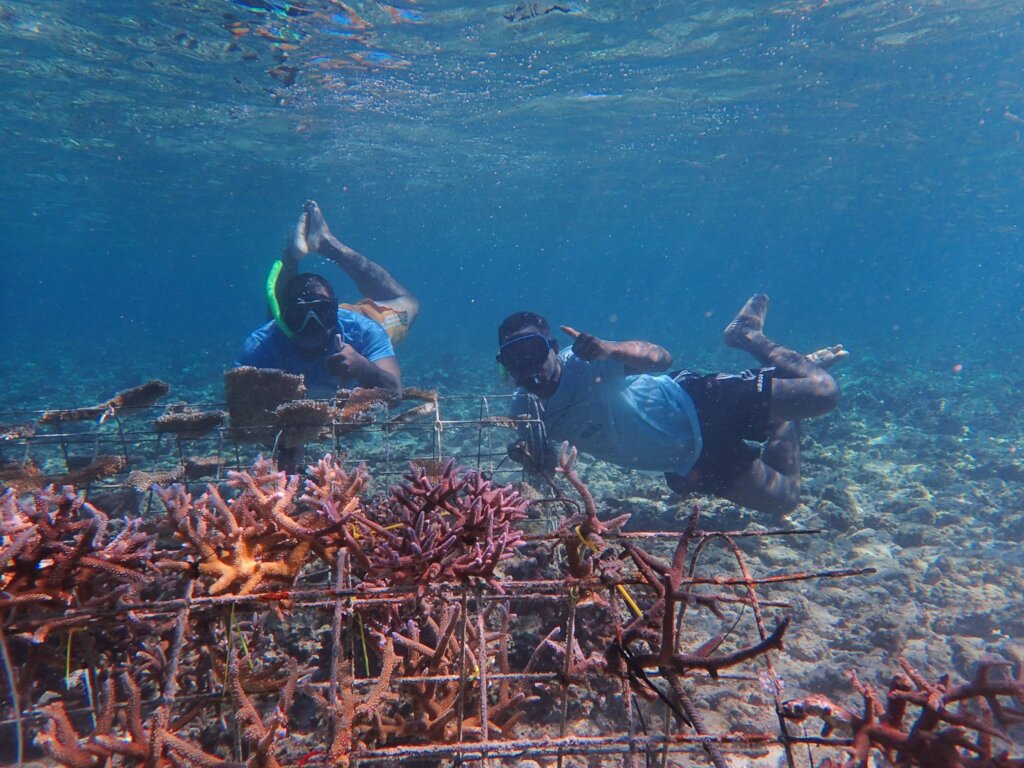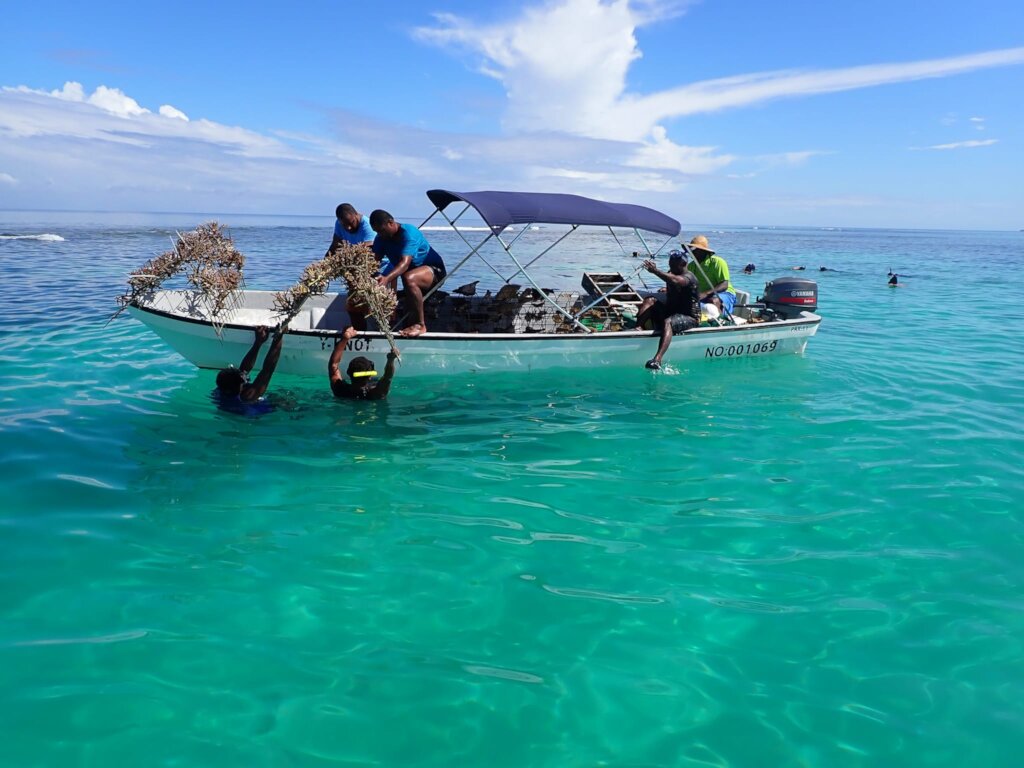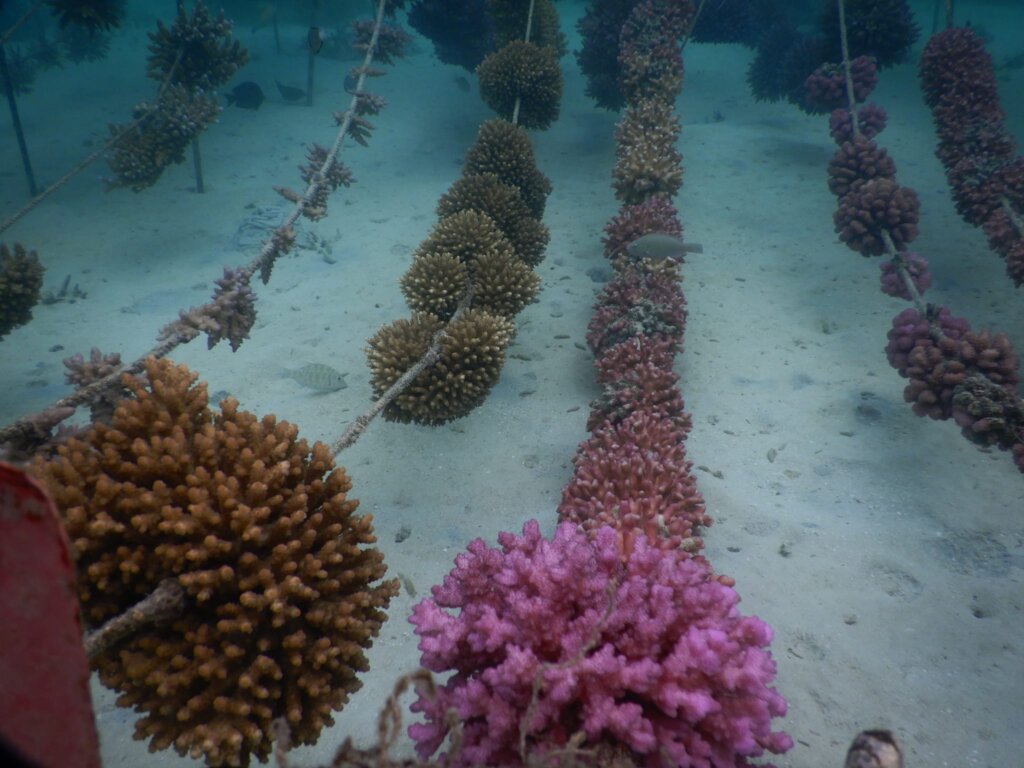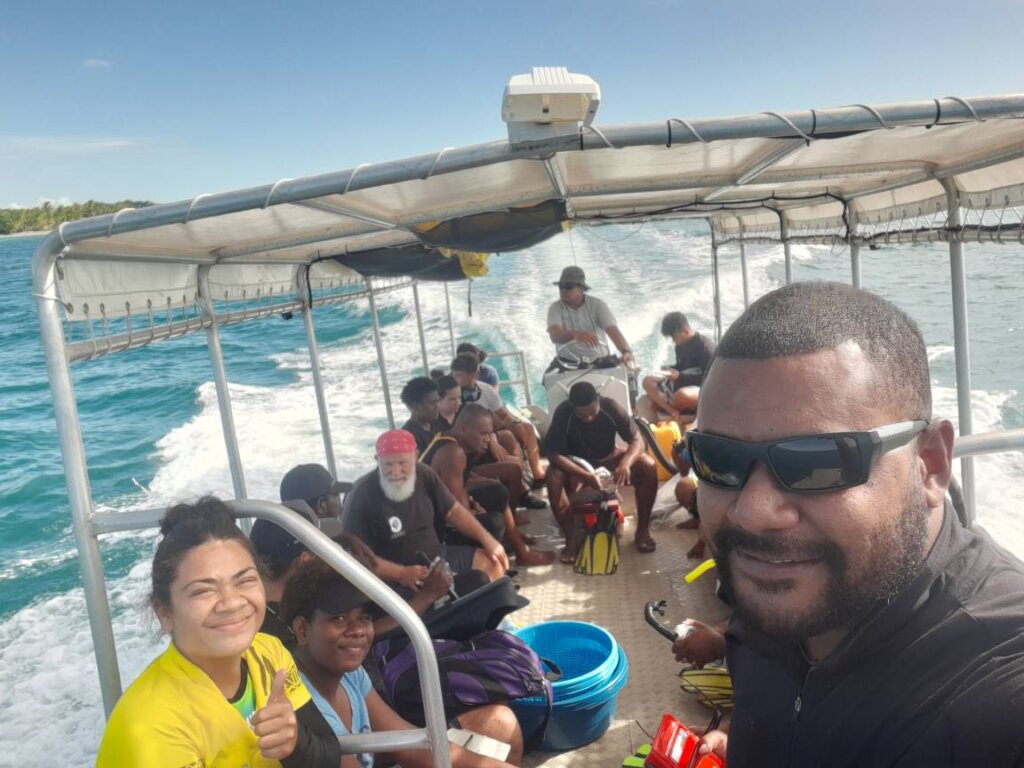By Austin Bowden-Kerby, Phd | Lead Coral Scientist
An Astounding Accomplishment: 90 people trained in Coral Reef Adaption at our International Workshops
We have been very busy. With nine volunteers in the site from several countries, we accomplished a lot of work in the coral nurseries. We also successfully carried out three major workshops in the past quarter for 90 people in total! In May and June, we conducted one-week workshops with a Fiji focus, training "coral champions" training ten fisheries officers, NGO staff, and recent marine biology graduates. In August we carried out an international workshop that included 7 from Papua New Giuinea and 5 from Samoa and others from Germany, USA, and Australia, and many more from Fiji. We have refined the curriculum and improved the course. Thanks to funds given by UNEP and DFAT, airfares into Fiji and workshop expenses were all covered. We also were able to establish a whole new site in the east of Fiji a hundred miles distant from the Malolo sites, at Leleuvia island, thanks to the additional funding!
An Amazing Number of Corals trimmed and planted in the Outer Barrier Reef Gene Bank:
At the workshops volunteers trimmed the amazing numbers of corals in the gene bank nurseries and used all of these excess corals to establish two new sites in the outer barrier reef. The area is 14km long by several hundred km wide. The entire backreef had been badly degraded by mass bleaching and cyclones in years past. Larger corals and branches were densely planted onto A-frames to create instant fish habitat within "nucleation patches", rather than planting small corals over wider areas. The fish moving into the corals will help keep the corals free of algae, sand, and silt, and help the corals grow well. The fish will hopefully also clean the areas surrounding the corals and cause the bare clean rocks to attract incoming coral larvae, so the coral patches will grow over time. With two sites complete, we plan to establish as many as we can over the coming months, and well before the hot coral bleaching season, which starts in January.
Outer Reef Sites Tested by Mother Nature's Big Waves: Lessons Learned
The first of our new outer reef sites was established in an area where every month or two, some very big waves roll over the site. This was done intentionally, in order to test our methods against cyclones, which will inevitably impact all of the outer reef. The other sites are not nearly so high energy, and will only experience such big waves during cyclones, but we need to learn what methods are able to withstand cyclone waves and currents. A few weeks after we put in the A-frames, fish house structures, and other methods, HUGE waves hit the site, and several A-frames flipped and several rope outplant trials were destroyed. Fortunately, none of the cemented corals were impacted, neither were the A-frames anchored into the reef framework. We have used these lessons to further harden the site and to learn methods that will resist cyclones in the other more protected areas of the restoration zone.
Major Milestone with Bleaching-resistant Super Corals Sharing Resistant Super-Algae:
So this is a major milestone: our bleaching resistant super corals are finally being moved onto the cooler outer barrier reef! This will allow them to share their resistant algae with other corals, and spread the resilience to incoming coral larvae, which come in without their symbiotic algae. So now there is a source of resistant super-algae on the outer reef, which can be shared! When the next marine heat wave arrives and mass bleaching hits, our corals and hopefully the juvenile corals that settle nearby, will not bleach!
GlobalGiving Funds from Little by Little Matching, coupled with an existing source, made it possible for Corals for Conservation to order a locally made fiberglass boat:
In other news: we ran into a serious problem with boats and access to the offshore sites in our main Malolo sites. The Resort boat we have been allowed to use for the past 2+ years has a broken engine, and so we have had to rent boats - $250. FJD for a half day. Therefore, we began searching for a good boat with an engine, as we had gotten 8K in the UNEP budget, and we put that with GlobalGiving Funds. Last week we ordered a locally made fiberglass boat and 60HP engine, plus canopy to shade the corals! We will still need to fundraise for fuel, as it is so expensive now, but we are on our way to more permanent solutions! We invite our donors to consider becoming recurring donors, and your gift will be matched after 3 months of loyalty. As the key winter fundraising months approach, you'll already be on board! How great is that!
Implementation of our Coral Adaptive Strategies are Yielding Valuable Data with World-wide Significance:
Much progress is being made with our cooler outer-reef stategies which can ultimately add decades to coral reef and species survival. The richness of the entire marine ecosystem is vital--Corals for Conservation is proving that a mono-culture coral bed is not the answer. Interest in our discoveries and practical low-cost/ high indigenous community involvement model is getting attention throughout the South Pacific. The demand for the training sessions is very high. While additional resources are now coming in, they are not sufficient for the increased workload and for giving stipends to marine biology graduates. Without GlobalGiving and donors like you, we would not be able to continue!
Vinaka Vakalevu!
By Dr. Austin Bowden-Kerby | Science Director
By Austin Bowden-Kerby, Phd. | Lead Marine Scientist: Corals for Conservation
Project reports on GlobalGiving are posted directly to globalgiving.org by Project Leaders as they are completed, generally every 3-4 months. To protect the integrity of these documents, GlobalGiving does not alter them; therefore you may find some language or formatting issues.
If you donate to this project or have donated to this project, you can receive an email when this project posts a report. You can also subscribe for reports without donating.
Support this important cause by creating a personalized fundraising page.
Start a Fundraiser